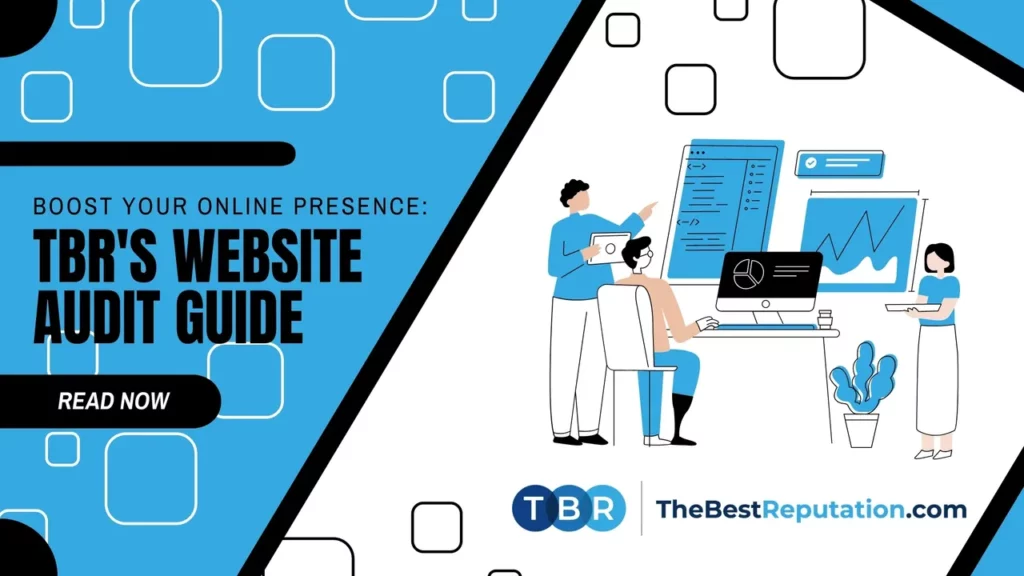Boost Online Presence: TBR’s Comprehensive Website Audit Guide

A website audit is an indispensable step for enhancing your website’s digital footprint. It is through comprehensive evaluation of the website’s technical operations, content quality, and user interface that an audit can pinpoint areas requiring optimization. Once these areas are addressed, it will uplift your SEO ranking and elevate user experience. Let’s dive into the world of website audits with TheBestReputation.
At TheBestReputation, we see a website audit as an intricate assessment of a website’s efficacy, architecture, and content. It lays the foundation for enhancing a website’s search engine optimization (SEO) and user experience (UX). This blog post outlines the various elements of a website audit and how it can be a game-changer in bolstering your online presence.
Why should you opt for a website audit with TheBestReputation?
Starting with the technicalities, a website audit involves scrutinizing the website’s framework, code, and speed. The audit helps identify and rectify any technical glitches that could be undermining the website’s SEO, such as broken links, prolonged page loading times, and duplicate content. With TheBestReputation, you can trust that we bring a wealth of expertise to this technical evaluation.
Further, an audit meticulously reviews the website’s content, checking keyword density, meta descriptions, and title tags. These critical factors influence how search engines rank a website. Moreover, the audit eliminates any duplicate content, which could adversely impact SEO.
Lastly, a website audit evaluates the website’s user experience (UX), examining easy navigation, clear calls-to-action, and responsive design. An intuitive, user-friendly website not only enhances the user experience but also boosts SEO.
Essentials of a Website Audit Checklist with TheBestReputation
- Technical SEO: Begin with a thorough analysis of your website’s technical parameters such as structure, coding, and speed. Keep an eye out for broken links, slow page loading times, and duplicate content.
- On-page SEO: Review on-page SEO elements such as title tags, meta descriptions, and header tags. Ensure your website content is rich in relevant keywords and resonates with your target audience.
- Mobile optimization: Ensure your website is mobile-friendly, featuring a responsive design and quick loading times on mobile devices.
- Content Quality: Assess the quality and relevance of your website content. It should be engaging, informative, and unique.
- Backlinks: Examine the backlinks to your website. They should originate from credible and pertinent sources. Eliminate any broken links or those originating from low-quality or spammy websites.
- Analytics: Analyze your website’s analytics data to understand visitor interactions. This data will help you identify areas needing improvement such as high bounce rates or low site engagement.
- User Experience: Review the UX of your website to ensure it is intuitive, visually pleasing, and features clear calls-to-action.
- Sitemap: Confirm that your website has an updated sitemap submitted to Google and Bing.
By adhering to this checklist provided by TheBestReputation, you can conduct a detailed website audit, targeting all vital elements that could affect your website’s SEO and UX. Frequent audits ensure you stay abreast of any issues, facilitating continuous improvements to your website.
Free Tools to Help Audit Your Website
There’s a host of free website audit tools that can help you assess your website’s performance, structure, and content. Here are some favorites:
- Google Analytics: A free tool by Google allowing you to monitor website traffic, user behavior, and conversion rates. It can help identify areas needing improvement.
- Google Search Console: Another free offering from Google, it helps monitor your website’s performance in Google search results and check for any technical errors.
- Woorank: This free tool reviews your website’s on-page SEO, backlinks, and mobile optimization, providing a detailed report on areas that need improvement.
- SEMrush: This tool gives a detailed overview of your website’s SEO, PPC, content marketing, and social media performance, including backlinks, organic search, paid search, display advertising, and more.
- Ahrefs: This free tool helps analyze your website’s backlinks, organic search traffic, and keyword rankings.
- GTmetrix: This free website speed test tool analyzes your website’s page load time, page size, and number of requests.
By employing these free website audit tools recommended by TheBestReputation, you can comprehensively understand your website’s performance and recognize areas needing attention. Remember, in their free versions, some of these tools might have limitations regarding the data they provide.

